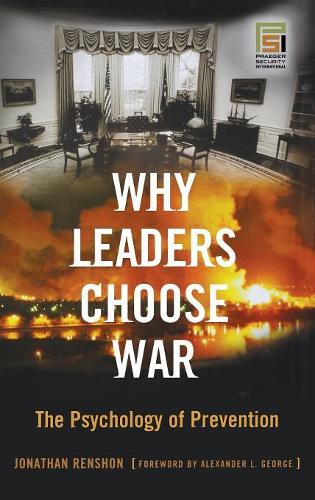
Why Leaders Choose War: The Psychology of Prevention
(Hardback)
Publishing Details
Why Leaders Choose War: The Psychology of Prevention
By (Author) Jonathan Renshon
Bloomsbury Publishing PLC
Praeger Publishers Inc
30th May 2006
United States
Classifications
General
Non Fiction
International relations
327.172
Physical Properties
Hardback
240
Width 156mm, Height 235mm
539g
Description
Preventive war has a long history in international politics, but until it became an instrumental part of the Bush Doctrine, it was mostly overlooked. Renshon argues that the best avenue for understanding decisions to initiate preventive action is through a close examination of the individual leader responsible for such decisions. In this work, he develops a theory of psychological motivations for preventive action. By examining five situations, including the Iraq war, he pinpoints the factors that matter most in decisions to take preventive military action. There have been preventive wars throughout history, but the motivations behind them have remained elusive, and many crucial questions remain unanswered. What exactly constitutes preventive action What differentiates preventive action from pre-emptive action Are there significant differences between preventive strikes and full-on preventive wars What is the relationship of preventive action to traditional concepts of deterrence, compellence, and international law Finally, why do states initiate preventive action Renshon argues that the best avenue for understanding decisions to initiate preventive action is through a close examination of the individual leader responsible for such decisions.
Reviews
The old American way of war, in which problems abroad were avoided until they spilled over and directly threatened American security interests, has been superseded by the new Bush doctrine of preventive attack. Renshon, writing while still in the PhD program at Harvard, uses the lens of political psychology to examine five historical cases of prevention. These include American war planning from 1946 to 1954; British action in the 1956 Suez Crisis; Israel's bombing of Iraq's nuclear reactor in 1981; Indian preventive war planning from 1982 to 2002; and America's preventive war plan against Iraq in 2003. Renshon's theory of psychological motivations highlights six factors thought to influence the preventive war decision, including declining relative power, bad faith image of the adversary, a conviction that war is inevitable, the perception that there is a brief window of opportunity in which to act, a situation that appears to favor a first strike, and black-and-white thinking. These are filtered through the psychology, beliefs, and judgments of individual leaders, supplemented by discussions of governing constraints, personal dynamics including risk tolerance, and state reputation. Ultimately, Renshon argues the most profitable manner in which to understand preventive war is through a detailed psychological examination of individual leaders. Highly recommended. Upper-division undergraduates through faculty. * Choice *
[I]t will interest many psychologists (particularly psychologists who are interested in history and politics). Renshon provides an interesting analysis of the choices for and against preventive war and places these events within important historical contexts. Furthermore, he helps the reader appreciate the difficult decisions world leaders face when responding to adversarial actions by other countries.[w]orth reading. * PsycCritiques *
Renshon's analysis is sure to capture the attention of policymakers, scholars, and students alike (including my own undergraduate honors students, among whom the book inspired lively debate), and makes a strong contribution to security studies and to political psychology.I strongly and wholeheartedly recommend Why Leaders Choose War: The Psychology of Prevention, as is fosters critical thought and contributes to theory building by placing leaders front and center in explaining why countries make the consequential decisions to advocate or to oppose preventive war or preventive strikes. An engaging read for a variety of different audiences. * Political Science Quarterly *
Jonathan Renshon's purpose in this engaging and useful book is to help us better understand the conditions under which leaders well resort to preventive military action. Correctly noting that this is an understudied yet important question, Renshon methodically sets out to point us in the direction of answers.The case studies are clearly written, well-researched, and efficient. Indeed, readers interested only in the cases themselves will find them very useful as capsule histories.[h]e sets out merely to take the first steps down the road to a comprehensive theory. This he has certainly done. May the journey continue. * Political Psychology *
Renshon examines the US invasion of Iraq, President Eisenhower's rejection of preventive war against the USSR, British-French-Israeli war against Egypt in 1956, Israel's bombing of Iraq's Osirak nuclear reactor in 1981, and two decades of India-Pakistan conflicts to explore why leaders opt for preventive war or not. He investigates the causal weight of five factors that may contribute to a decision for preventive war; declining power in relation to an adversary, an inherent bad faith image of the adversary, a belief that war or serious conflict is inevitable, the belief that there is only a short window in which to fact, and a situation that is believed to favor the offensive. In the end he finds that it is the psychology of the individual leader that will tip the decision the one way or another, even in the presence of all five of the factors. * Reference & Research Book News *
Author Bio
Jonathan Renshon is a doctoral student in the Government department at Harvard University, focusing on international security issues. He holds a master's degree in international relations from the London School of Economics and Political Science and has served on the editorial board of the Millennium Journal of International Relations.
